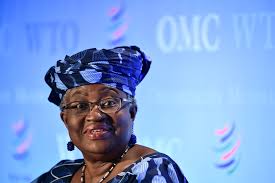
But for the United States’ lone opposition, Nigeria’s candidate for the Director-General of the World Trade Organisation (WTO), Dr. Ngozi Okonjo-Iweala, would have been declared the winner of the race yesterday.
Despite securing the vote of 163 of the 164 members of the trade organisation, the former coordinating minister for the economy and minister of finance of Nigeria could not be declared the head of the WTO because of the objection by the US, which cited lack of experience and procedural issues for its stance.
By the organisation’s selection rules, its DG has to emerge by consensus. But the majority, according to sources close to the process, may assert its will at the general meeting of the organisation scheduled for November 9, using a proviso that allows a vote in the event of failure of consensus.
Ms. Yoo Myung-hee of South Korea, backed by the US, is Okonjo-Iweala’s sole opponent. Okonjo-Iweala, who has locked in the support of China, the European Union, Africa, Asia, Latin America and the Caribbean member-countries, has the best chance of attaining the consensus of membership of the global trade body, its General Council Chair, Mr. David Walker, said yesterday.
Spokesman for the WTO, Mr. Keith Rockwell, at a media briefing at the end of the meeting of the organisation, said: “The candidate that had the best chance of attaining a consensus of membership is Dr. Ngozi Okonjo-Iweala of Nigeria. Consultations on the way forward will start immediately.”
While consultation continues, the next meeting has now been scheduled for November 9th, where members would be seeking to get a consensus. This would come after the US presidential election scheduled to be held on Tuesday.
According to the sources, the US objection was anchored on procedural grounds, adding that constituents from across the regions who took the floor stressed that this cannot stand because the process was unanimously agreed on and that it would be wrong to change it midway. Members have used consensus on every decision in electing a director-general in the history of the WTO.
“In the rules, however, there is a provision that allows for majority vote. But that has never been used before, so we don’t know whether members would want to set a precedent with this DG selection process.
“So, really, anything can happen on November 9th. So, all options are open.”
Section 20 of the WTO Procedures for the Appointment of Director Generals states: “If, after having carried out all the procedures set out above, it has not been possible for the General Council to take a decision by consensus by the deadline provided for the appointment, members should consider the possibility of recourse to a vote as a last resort by a procedure to be determined at that time.
“Recourse to a vote for the appointment of a director-general shall be understood to be an exceptional departure from the customary practice of decision-making by consensus, and shall not establish any precedent for such recourse in respect of any future decisions in the WTO.”

